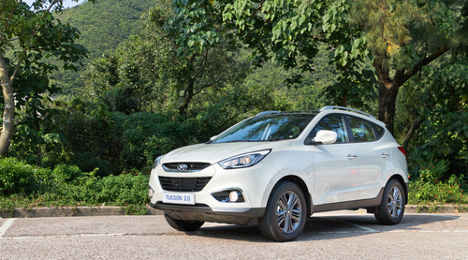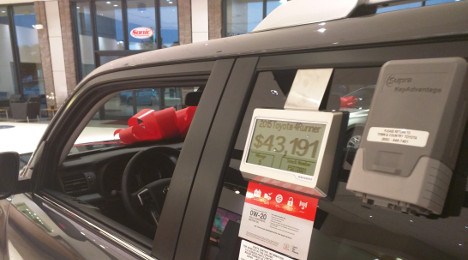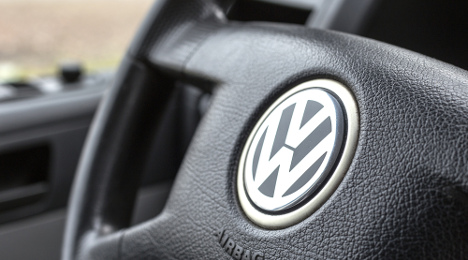Autotrader will be hosting its final Interactive Dealer Summit of 2015 at the beginning of December in Atlanta – if you cannot make it, a free simulcast will be available.
The event will be streaming from Atlanta on Tuesday, Dec. 15 from 9 a.m. to 3:30 p.m. EST. Register here.
What can you expect to learn about? Autotrader will be discussing the latest information from industry thought leaders on car-shopping behaviors and how it interacts with real life and the Internet world.
Autotrader’s Interactive Dealer Summits regularly include speakers from Autotrader, Cox Automotive, Haystak Digital Marketing, Kelley Blue Book, vAuto and VinSolutions.
A link to view the simulcast of the event will be provided following registration.
According to Autotrader, the Interactive Dealer Summit speakers will be discussing the following topics:
- How today's customers shop for cars
- How to improve dealer visibility in the digital marketplace
- How to reach today's consumer at every stage of their car-shopping journey
- How to build in-store processes that produce great sales results
The analysts at Edmunds.com set out explore an interesting question. Since there are a variety of vehicles named after geographical locations – examples being the Toyota Tacoma, Hyundai Tucson, Chevrolet Colorado, etc. – are any of these vehicles actually popular in the areas they’re named after?
Picking through Polk’s registration data – the answer to that is pretty clear: No, the vehicles are not particularly popular in the areas they’re named after. So, if they were, what should they be named?
Check out the following analysis from Edmunds:
Vehicle name: Buick LaCrosse
New name: Buick Kincaid
Only 0.2 percent of new cars purchased this year in La Crosse, Wisc. were a Buick LaCrosse. In fact, 4,752 other cities and towns in the U.S. enjoyed a larger share of LaCrosses. But if you want to find the biggest concentration of Buick LaCrosse sales, follow the Mississippi River about 400 miles south toward Kincaid, Ill., where the sedan made up 8.9 percent of all new-car registrations this year. With an area under one square mile and a population of less than 1,500 people, Kincaid can nevertheless claim the title of the "LaCrosse Capital of the United States."
Vehicle name: Chevrolet Colorado
New name: Chevrolet Montana
You'd expect this versatile truck to be a top choice for Coloradoans to navigate the rugged Rocky Mountain terrain, right? Wrong. Colorado is actually the 34th most popular state for the compact pickup, which makes up just 0.5 percent of the state's new vehicle registrations so far in 2015. So where are you most likely to find the Chevy Colorado? Head two states north to Montana, where the truck has made up two percent of all new vehicle purchases this year. And let's be honest: "Chevy Montana" sounds like the kind of truck you'd want to help you herd livestock through the Great Plains.
Vehicle name: Chevrolet Malibu
New name: Chevrolet Garciasville
As it turns out, there isn't a whole lot of Southern California love for the Chevy Malibu. Only 0.1 percent of new car registrations in its namesake community carried the Malibu nameplate this year, ranking the beachside city as the 10,789th most popular locale for the vehicle. If you want to find the top town, you'll have to travel 1,600 miles away from Malibu to Garciasville, Texas, located just over the Mexican border on the Rio Grande, where more than 15 percent of all new car registrations this year are Chevy Malibus.
Vehicle name: Dodge Durango
New name: Dodge Castle Dale
On the surface, "Durango" is a perfect name for this vehicle. It suggests a certain toughness that you'd want in your SUV. Too bad for Dodge that the folks in Durango, Colo. aren't responding accordingly. Only 0.5 percent of car buyers in this picturesque mountain town opted for the Dodge SUV. But one place where this vehicle is most appreciated is less than one gas tank away in Castle Dale, Utah, where 7.7 percent of all new car purchases this year were Durangos.
Vehicle name: Hyundai Santa Fe
New name: Hyundai Clements
Santa Fe might be the capital of New Mexico, but it's far from being the capital of its eponymous SUV. Only one tenth of one percent of all new car purchases in this city of about 70,000 people were Hyundai Santa Fes year to date. One place where the Santa Fe SUV is truly appreciated, though, is Clements, Md. So far in 2015, 5.6 percent of all new car sales in this unincorporated town in the heart of the Chesapeake region were Santa Fes.
Vehicle name: Hyundai Tucson
New name: Hyundai Wilmington or Hyundai Fort Garland
The folks in Tucson may be able to rally around their Arizona Wildcats, but there's far less enthusiasm for the car that shares the city's name. Only four tenths of one percent of all new cars registered there this year were Hyundai Tucsons. But there is a spirited battle underway to claim this compact SUV: both Wilmington, N.Y. and Fort Garland, Colo. boast the largest share of Tucsons (6.7 percent of all new sales). In one corner you have Wilmington, which is perhaps most famous for hosting the alpine skiing events during the 1980 Winter Olympics. In the other corner, there's Fort Garland, where the average snowfall is 47 inches per year. Maybe these towns should settle this Tucson battle with a good old-fashioned snowball fight!
Vehicle name: Kia Sedona
New name: Kia Cedar Grove
Where's the "Sedona Spirit" in Sedona, Ariz.?! Not a single new Kia Sedona has been registered in its namesake town this year. Maybe Kia should start market research into the "Kia Cedar Grove." After all, nearly 13 percent of all new car purchases registered in this sleepy West Virginia town were Kia Sedonas. Perhaps the vehicle is more suited to navigate the Appalachian Mountains than the dusty desert terrain?
Vehicle name: Toyota Tacoma
New name: Toyota Kilauea
Almost two percent of vehicles registered this year in Tacoma, WA were Toyota Tacomas, which is relatively impressive, except when you consider that 5,492 other U.S. cities and towns have a better showing. Unfortunately, it's impossible to drive a Tacoma from Washington state to the place where the compact truck is most popular. That's because the town with the highest rate of Toyota Tacoma purchases this year is 2,600 miles of ocean away in Kilauea, Hawaii. Believe it or not, more than one out of every four new cars registered this year in this Hawaiian paradise (26.5 percent, to be exact) is a Toyota Tacoma. That sort of brand loyalty is enough to make any Toyota executive say "Aloha!"
It’s that time of year again – the time of “Movember” and “No-Shave November.”
As we’re a couple of weeks into the month of November, you may be noticing quite a few men sporting freshly grown facial hair of various shapes, sizes and intensities, many in the name of various men’s health awareness initiatives.
One notable organization – the Movember Foundation – uses this time especially to collect donations to fight various men’s health issues, including prostate cancer, testicular cancer, poor mental health and physical inactivity.
And Autotrader would like to help.
On its own Movember website, Autotrader is sponsoring a campaign to assist the Movember Foundation by gathering mustached selfies from its dealer and OEM clients and donating $1 to the foundation for every selfie posted (up to a total donation of $2,000). Autotrader also says it will donate $3,000 on behalf of the client team that raises the most money. Teams can register here.
"Community service and wellness are core company values Autotrader shares with our dealer and OEM clients,” said Kevin Filan, vice president of customer marketing at Cox Automotive, Autotrader’s parent company. “We are very happy to lend our support to the important work related to men’s health that is being undertaken by the Movember Foundation.”
Dealers: ever wish the hang tags for your inventory on the lot would update themselves? That’s the aim for eCarTag, a subsidiary of Pearl Technology Holdings, who announced that its digital hang tags have just completed a first test pilot with Sonic Automotive, who plans to install the tags at all of its dealerships next year.
Sonic tested the tags for 90 days at its flagship dealership, Town and Country Toyota, in Charlotte, N.C.
Following what Pearl says was an “overwhelmingly successful” pilot, the company says that Sonic has ordered tags for its entire new and pre-owned inventory across the country, with a rollout to begin in 2016.
“We were thrilled that the pilot was so successful,” said Jeff Dyke, Sonic Automotive’s executive vice president of operations. “Dealers can sympathize with the amount of labor and effort that goes into changing paper tags on a daily basis in more than 100 Sonic dealerships across the U.S.
“Here at Sonic we have aggressive market pricing strategies across our dealerships that utilize a central custom pricing platform. The tags solve a huge issue for us and give us the speed and technology we have desperately needed. Such a simple idea, but not so simple to execute. So, I commend Pearl for bringing eCarTag to market and I’m sure other dealers will do the same.”
According to Pearl, the eCarTag digital tags are battery powered with an estimated battery life of approximately four years and a replacement cost of said batteries of only a “few dollars.” The tags can be installed and programmed by simply scanning a vehicle’s VIN and the digital tag with a smartphone. The tag then instantly synchronizes the vehicle to its listed price, which will proceed to update automatically.
The tags have other tricks, too, such as displaying up to five different messages in rotation, which can display targeted messages such as lowest payments, promoted sales, or even congratulate a customer who just purchased the vehicle.
“Paper hang tags have long been a hassle for dealers and are one of the most glaring changes that have been needed for decades,” said Bruce Thompson, Pearl’s chief executive officer. “Dealers are changing prices on the Internet faster than ever before. They pay attention to the competition and some dealers change prices daily. Most states regulate that the price on the Internet and the price on the lot must be the same.
“This creates a huge logistical challenge at the dealership. We simply catch the Internet feed from the dealer’s listing tool and as prices change on the Internet, they are instantly changed on the lot.”
For more information on eCarTags, visit its site here.
Following a public comment period, the Federal Trade Commission approved final consent orders against two Las Vegas dealers that the regulator determined to have misrepresented the cost of vehicle in advertising.
Officials recapped that back in June, TC Leadership —which does business as Planet Hyundai and Planet Nissan — agreed to settle FTC charges that their ads included heavily discounted prices that were not generally available to consumers.
The consent orders prohibit the dealers from misrepresenting the cost of financing or leasing a vehicle, stating the amount due at signing without disclosing certain lease terms, and failing to comply with Regulation M and the Consumer Leasing Act, and Regulation Z and the Truth in Lending Act.
The dealerships are also prohibited from stating the amount or percentage of any down payment without disclosing repayment terms and the annual percentage rate.
The FTC vote approving the final Planet Hyundai and Planet Nissan consent orders was 5-0.
Selectbidder, a Canadian auto tech company best known for its auction-centric dealer trade networking platform for trade-in vehicles, launched its product in the United States market last month and officially announced its first American auction partner on Tuesday.
Eighteen-hundred miles away from Selectbidder’s Moncton, New Brunswick home is Melbourne, Fla.-based Space Coast Auto Auction, who will utilize the Selectbidder platform to orchestrate real-time bids for its network of dealers handling trade-ins.
How exactly does it work? To put it simply, the Selectbidder platform takes an auction’s already established network of dealers and connects those with recent or pending trade-ins to other dealers interested in buying them.
Joe Pritchett, Space Coast’s chief executive officer, explains his reaction to the solution, which was recently demonstrated for him at the 2015 NAAA Convention in Orlando, Fla.
“Once we saw how Selectbidder puts our auction into the trade-in process, I knew we needed to start using it,” Pritchett said. “With Selectbidder, our selling dealers are going to deal with us at the point of trade, allowing us to sell more cars straight from their lots. Our dealers and their customers are going to love how quickly and easily they get live offers on their Trade-ins. For our dealer buyers, it’s going to allow them to tap into fresher vehicles earlier in the remarketing process.”
Basing the system around what Selectbidder considers the “original dealer network” – the auction – the company aims to increase transparency for everyone involved, including the customer, who can see for themselves how much the dealer will receive for the trade-in vehicle at the next step in the sale cycle.
In a previous interview with Auto Remarketing, Selectbidder chief executive officer Sean Liptay said he hopes this is just the beginning of his tech-company’s growth in the U.S.
“The beauty of the product is that it can be up and running within a week in any location in North America, based around surrounding independent auctions,” Liptay said. “So it doesn’t matter if it’s the local auction in Florida versus the local auction in Louisiana, they can be up and running because they already have the relationship network built.”
Interested in reading more about Selectbidder and other companies making noise in the auction industry? Stay tuned for our Oct. 15 issue of Auto Remarketing, both in print and online, where we delve further into the topics of digital trends, tools and strategies for the wholesale market.
Editor Joe Overby contributed to the reporting for this story.
After reading this headline, you may be saying to yourself, "What is a 'phablet?'"
Or holding back a chuckle at the silly sound of the word.
While either of those might be an appropriate response, a "phablet" — a smartphone with a screen size of 5.5 inches or larger, nearing the size of a tablet — is the source of media for a large constituent of mobile users.
And, according to the J.D. Power 2015 Automotive Mobile Site Study, the satisfaction with OEM and third-party automotive websites is higher across all aspects of the online experience among shoppers using them.
"Automotive manufacturer and third-party website designers should be mindful of growing phablet usage and take advantage of the larger screen by displaying more content and adding detail to maximize shopper satisfaction and drive more traffic to dealer showrooms," said Arianne Walker, senior director of automotive media and marketing at J.D. Power. "The time spent on mobile devices for automotive shopping is increasing, and this trend of buying and using phablets is expected to continue."
Breaking down the numbers, the study shows that vehicle shoppers using "phablets" are more satisfied with their individual website experiences than those who use smaller smartphones (797 versus 771, respectively, on a 1,000-point scale).
There are also significant satisfaction gaps in individual study measures for shoppers using larger or smaller smartphones, including satisfaction with information/content (796 versus 769), navigation (783 versus 758), appearance (816 versus 791) and speed (794 versus 767).
Acura, TrueCar shine in website rankings
Looking directly at the ratings of manufacturer-branded and third-party website rankings, on the same 1,000-point scale, Acura ranked the highest (812) in overall customer satisfaction index scores of OEM sites while TrueCar ranked the highest (776) among its third-party rivals.
Here are the top three for each segment:
Manufacturer-branded mobile site rankings
- Acura (812)
- Infiniti (809)
- Fiat (808)
Third-party mobile site rankings
- TrueCar (776)
- CarGurus & Yahoo! Autos (both 744)
- U.S. News Best Cars (742)
Want to check out the full J.D. Power Automotive Mobile Site Study? Click here.
Dealers: do you have customers you would like to notify about their vehicle’s recall status, but you’re apprehensive to contact them due to being on the National Do Not Call Registry?
Rest assured: NADA Regulatory Affairs reminds dealers that the “do-not-call” rules do not prohibit dealers from calling consumers about vehicle recalls. As long as the defect repair work involves no cost to the customer, at least.
According to NADA, itself citing the Federal Communications Commission’s ruling from 2005, “calls that encourage the purchase of other goods and service ‘will be deemed a prohibited telephone solicitation.’”
NADA noted that this specific clarification only applies to the National Do-Not-Call rules and is not applicable to the separate restrictions of the Telephone Consumer Protection Act (TCPA) for text messages, pre-recorded calls, calls made to cellphones, or calls made using auto-dialers.
The association urges dealers to consult their legal counsel before making a decision regarding a recall-notification telephone strategy for its affected customers.
Strong dealer-consumer relationships increase recall repair rates
Anita Lienert, a correspondent for Edmunds.com, also shared in a post on the Edmunds site the results of a recent survey conducted by Public Opinion Strategies, on behalf of Auto Alliance and the Association of Global Automakers, suggesting that consumers who have established a relationship with a dealer participate in recalls more often than those who have not established that type of relationship.
Even though time is the only cost to the consumer for most recall repairs, the research sought to find out why roughly 25 percent of owners of recalled vehicles never complete the free repair of their vehicles.
According to the Edmunds post, one key finding from the survey found that many consumers are doing their own “risk assessments” when they receive a recall notice, deciding whether or not it’s worth their time to take their vehicle in for the remedies.
A statement from the Auto Alliance last week said that, “Many survey respondents showed a reduced likelihood to repair a recalled vehicle if they perceived the recall to be ‘low’ or ‘moderate’ risk, saying it seemed to be ‘no big deal.’ Used vehicle owners are less likely to be motivated to respond to recall communications, even when they are aware of a recall on their vehicle.”
According to the survey, consumers are more likely to heed recall repair notifications if the severity of the recall is high, if they are especially reminded that it is free, or if a reminder of open recalls is provided in their insurance renewal notices.
Dealers: Have you found any particularly potent way to convince your customers to bring their vehicles in for recall repairs? Let us know in the comments below or gives us a shout via social media via the links on the left of this page.
Perhaps owners of Volkswagen diesel vehicles swept up in the recent controversy aren’t unloading these units in droves. However, recent data from Kelley Blue Book and Autotrader indicated that these consumers are at least acquiring more information about what their vehicle still might be worth.
According to Kelley Blue Book’s recent website metrics, Volkswagen TDI trade-in value lookups have increased 79 percent, while trade-in value inquiries for the brand as a whole have jumped by just 10 percent. Those trends are based on a week-over-week comparison from late September data that KBB reviewed and released on Monday.
KBB also mentioned that Volkswagen TDI Research has increased 13 percent for new models, and increased 16 percent for used vehicles. Meanwhile, site officials noticed Volkswagen total research has increased 15 percent for new vehicles, but decreased 12 percent for used models.
All told, inquiries for VW increased 10 percent on KBB.com
“During the last week since news broke of the emissions crisis, traffic to both KBB.com and Autotrader.com has generally increased for Volkswagen, particularly for the diesel models, but at this point it is hard to determine the mindset and intentions of precisely what these early surges in activity represent," said Rick Wainschel, vice president of customer analytics and insights for Kelley Blue Book.
“The increased level of trade-in activity on KBB.com and private seller activity for Autotrader appear to show that consumers are curious to see if values of these models have dropped, and demonstrate they may have some level of concern on this aspect of the emissions issue,” Wainschel continued.
“At the very least, it indicates that consumers are hungry for information about values,” he added.
Over at Autotrader, officials determined that consumers shopping for Volkswagen diesel units is up 7 percent week-over-week, while shopping activity for the brand as a whole is off by 1 percent.
Autotrader also mentioned Volkswagen private seller activity for diesel models is up 19 percent as total VW private seller activity ticked 1 percent higher.
Autotrader Listing Information for Volkswagen
| Make |
Fuel Type |
Interest % Chg.
(VDPs / Listing) |
Price % Chg. |
Listings % Chg. |
Price Chg. |
| Volkswagen |
Diesel |
7.0% |
(0.7%) |
(3.9%) |
($175.45) |
| Volkswagen |
Non-Diesel |
(2.0%) |
(0.1%) |
1.1% |
($20.12) |
| Volkswagen |
All |
(0.7%) |
(0.4%) |
0.3% |
($82.91) |
| Non-Volkswagen |
Diesel |
(0.9%) |
0.2% |
0.4% |
$77.96 |
| Non-Volkswagen |
Non-Diesel |
(1.0%) |
0.2% |
1.3% |
$38.45 |
| Non-Volkswagen |
All |
(1.0%) |
0.1% |
1.2% |
$33.83 |
| Source: Autotrader Inventory, Sept. 12 to Sept. 18 (pre-announcement) versus Sept. 19-Sept. 25 (post-announcement) |
So what do all of these metrics means in light of the turmoil surrounding VW?
“This announcement impacts the diesel vehicles from Volkswagen, which carry higher residual values than their equivalent gasoline counterparts," said Eric Ibara, director of residual values for Kelley Blue Book.
“While early readings suggest that TDI vehicles are being affected by the news, it is possible that they could return to normal levels within a year,” Ibara continued. “This will depend on how Volkswagen handles this crisis and what they announce the fix will be for the U.S. market.”
A note about VW leasing
Another section of the VW story to watch is the leasing market. Swapalease.com reiterated that Volkswagen frequently offers aggressive lease deals on many of its makes and models, and as such, is well represented in the Swapalease.com marketplace.
As of Monday, Swapalease.com executive vice president Scot Hall said the site has not seen any “noticeable changes” in the behavior or patterns of either those individuals looking to get out of their lease, or those consumers looking to take over a lease.
“Please keep in mind that this pattern may change in the coming weeks due to Volkswagen’s pending plans for a fix on the diesel vehicles announced recently,” Swapalease.com said in a message to Auto Remarketing. “Leases under recall are not allowed to be transferred until documentation of a fix can be provided to the lease company, but so far customers are still allowed to make transfers.”
A weathered image
No matter what plan VW orchestrates to modify the diesel vehicles that regulators found to be not as efficient as previously believed, the automaker also has a public perception issue to tackle if surveys orchestrated by KBB and Autotrader are any indication.
Kelley Blue Book and Autotrader reported that more than 70 percent of KBB.com survey respondents believe the diesel emissions issue could spread beyond just Volkswagen.
As for the brand's reputation, the majority of those surveyed say they have “complete” or "general mistrust” in Volkswagen.
In addition, according to a recent Autotrader Quick Poll, 30 percent of the 914 respondents said they would be less likely to consider a diesel vehicle.
“Volkswagen can fix the mechanical problems and make reparations to owners, but winning back the confidence of shoppers and loyal buyers will be a daunting challenge that could take years to overcome," said Michelle Krebs, senior analyst for Autotrader.
“Every automaker should take note of the importance of integrity,” Krebs added
Kelley Blue Book's five-day survey wrapped up on Sept. 28 and gathered information from 1,002 respondents. The seven key highlights included:
— 64 percent of consumers are aware of the diesel emissions issue.
— 96 percent of those aware say that Volkswagen is the primary manufacturer involved.
— 63 percent cite "intentional deceit" as the most troubling aspect of this issue.
— 53 percent of respondents say they have "complete" or "general mistrust" in Volkswagen.
— 72 percent say they think this issue could spread beyond Volkswagen.
— 42 percent feel other automobile manufacturers also are secretly violating EPA emission rules.
— 58 percent are unsure if Volkswagen is taking proper actions in addressing this issue.
“Automotive consumers are well aware of the diesel emissions issue, and they have Volkswagen squarely in their sights as the manufacturer at fault,” Wainschel said. “As a result, the company's brand image is taking a hit.
“If this issue spreads, which consumers see as entirely plausible, other manufacturers — and diesel vehicles in general — also could be affected,” he went on to say.
String Automotive announced new agreements with several large dealer groups on Monday while also highlighting the new local-market focused upgrade to its Dealer Positioning System.
String has entered new enterprise-level relationships with the March Hodge Automotive Group, Feldman Automotive and All Star Automotive Group.
The company’s latest release of its Dealer Positioning System, or DPS, includes a local-market area view to help market within that range. The metro-market area view includes enhancements that aim to help traditional budgets and market share growth plans for both Tier 2 and Tier 3 budgets.
“Though our team had great respect for our vendors, we began placing a great deal of importance on believing only our own metrics for success,” said Kelly Deets, the digital marketing director at Your Auto Giant of New Port Richey, Fla. “At first, the only place we could find ROI-related metrics was through the reports that we received from our digital marketing vendors. After installing the DPS, we are able calculate our wins and loss across our entire advertising budget, customizing the plan based on each store’s best opportunity for growth.”
String also reported a 206-percent growth in year-over-year subscription sales in September for its dealership intelligence platform.
“With the ever-growing technological and digital marketing-related offerings in the vendor space, automotive marketers are under increasing pressure to understand what’s working and what’s not,” said Ken Kolodziej, String’s chief executive officer. “Our growth speaks to the fact that we answer that question for marketing director and VP of operations roles within the mid-major and regional automotive groups.
“With monthly budgets north of $100,000, the return associated with hyper-focused, market-share-driven advertising is too substantial for them to ignore.”












